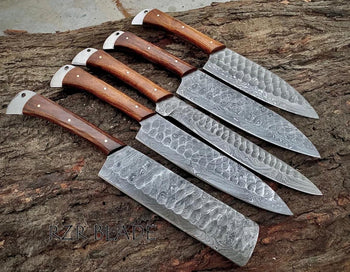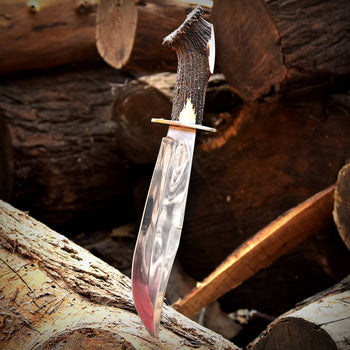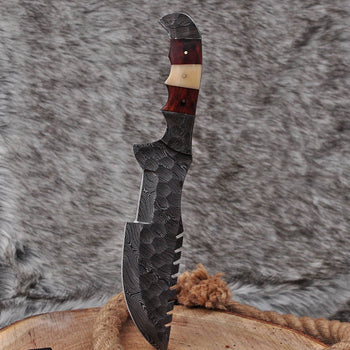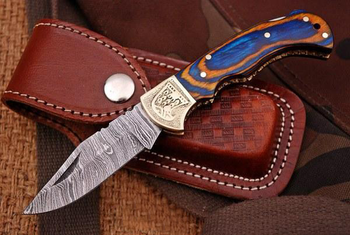When it comes to knives that strike the perfect balance between performance and aesthetic appeal, few compare to the Damascus steel knife. Known for its signature wavy patterns, superior edge retention, and rich history, this type of blade is as much a piece of art as it is a functional tool. Whether you're a home chef, outdoor enthusiast, or collector, owning Damascus steel knives requires a bit more attention—especially when it comes to cleaning and maintenance.
In this guide, we'll walk you through exactly how to clean a Damascus steel knife the right way, why proper care matters, and how to protect your investment for years to come.
Why Is Proper Cleaning Important for Damascus Steel Knives?
Unlike generic stainless steel blades, Damascus steel kitchen knives are made by forging multiple layers of steel together. Many high-quality Damascus blades include a mix of high-carbon steel, which is known for its sharpness but also its vulnerability to moisture and corrosion.
Improper cleaning or neglect can dull the blade, fade the unique patterning, or lead to rust. Considering the average Damascus steel knife price ranges from $60 to well over $500 for artisan-crafted pieces, proper maintenance isn't just recommended—it's essential.
Step-by-Step Guide: How to Clean a Damascus Steel Knife
Step 1: Rinse Immediately After Use
After each use, rinse your Damascus knife under lukewarm water. Avoid hot water as it can cause rapid temperature changes that might affect the blade's integrity over time.
Pro Tip: Never let food particles dry on the blade. Acidic ingredients like tomatoes, citrus, or vinegar can eat away at the steel and stain the surface.
Step 2: Use a Mild Soap
Use a soft sponge or cloth with a mild dish soap. Gently scrub the blade, avoiding any scouring pads or abrasive cleaners that could scratch the steel or dull the etching of the Damascus pattern.
Step 3: Dry Immediately and Thoroughly
As soon as you're done washing, dry the knife completely with a clean, soft towel. Any moisture left on the blade can cause rust or discoloration, especially if the knife contains high-carbon steel layers.
Avoid air-drying—it’s one of the biggest culprits of surface rust on Damascus steel.
Step 4: Apply a Thin Coat of Oil
To keep your Damascus steel knife in pristine condition, apply a very light coat of food-safe mineral oil or camellia oil to the blade after drying. This adds a layer of protection against moisture, oxidation, and corrosion.
If you're storing the knife for a long period, oiling is even more crucial.
What Not to Do When Cleaning a Damascus Knife
Don’t use a dishwasher: The heat, moisture, and harsh detergents in a dishwasher can permanently damage your knife.
Avoid bleach or acidic cleaners: These can strip the blade and destroy the beautiful layered patterns.
Never soak in water: Prolonged exposure to water—especially hot or soapy water—can lead to delamination or rust.
Don’t leave it dirty: Always clean your knife right after use. Letting residue sit on the blade is one of the fastest ways to damage it.
Additional Tips for Long-Term Maintenance
Store Properly
Use a knife block, magnetic strip, or blade guard to store your Damascus steel knife safely. Avoid tossing it into a drawer with other utensils where it could get nicked or scratched.
Regular Sharpening
While Damascus knives are known for excellent edge retention, regular honing with a ceramic rod can help maintain sharpness. For full sharpening, use a whetstone—ideally with guidance or help from a professional.
Know Your Blade Type
Not all Damascus steel knives are created equal. Some use stainless steel layers, while others feature carbon steel cores that require more upkeep. Knowing what your knife is made of will help determine how often it needs oiling and sharpening.
Damascus Steel Knife Price vs. Care Expectations
One of the most common questions people ask is: "Is a Damascus steel knife worth the price?"
With prices ranging widely based on craftsmanship, materials, and brand, a basic Damascus kitchen knife might start around $60, while handmade or collector-grade knives can exceed $500. While the Damascus steel knife price is certainly higher than that of a standard blade, what you get in return is performance, beauty, and durability—if properly cared for.
Think of it as an investment. Just like you wouldn’t leave a luxury watch in the rain, you shouldn’t neglect a high-end knife. Proper cleaning and care can make your Damascus knife last a lifetime, maintaining both its aesthetic appeal and its cutting power.
Final Thoughts
A Damascus steel knife isn’t just another kitchen tool or outdoor blade—it’s a legacy item. With its intricate patterns and superior cutting performance, it deserves proper care and attention. Cleaning your knife the right way not only keeps it sharp and rust-free but also preserves the artistry forged into every layer of steel.
So whether you're slicing, dicing, or displaying your blade with pride, treat it well—and it will return the favor every time you use it.
Looking to buy high quality Damascus knife? Shop the best Damascus steel knife for your needs only from the trusted knife store online in USA - AJ SANITY.





![How to Clean a Damascus Steel Knife [The Ultimate Guide]](http://aj-sanity.com/cdn/shop/articles/DSC_2024-06-03T20_05_55.848Z.webp?v=1743874065&width=1100)
![Alice Belts Are Back [Ultimate Guide] – Classic Military Gear for Today’s Adventurer](http://aj-sanity.com/cdn/shop/articles/DSC_6190.webp?v=1749141273&width=100)
![Top 5 Father’s Day Gifts for Dads Who Love Adventure [2025]](http://aj-sanity.com/cdn/shop/articles/DSC_2420_1fdbad4a-e3b1-42e3-bb1b-b78100cd538b.webp?v=1748364808&width=100)


